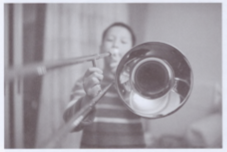Click vào các phương án để chọn. Nếu thấy sai, click vào phương án đã chọn để chọn lại.
Five sentences have been removed from the text below.
For each question, choose the correct answer.
There are three extra sentences which you do not need to use.
What's the point in studying music?
A. Students have also shared their own ideas about music. A
B. And creating music can make you feel the same way. B
C. So it could be that these school subjects are linked in some way. C
D. These explain why music affects us in certain ways. D
E. And there was a difference between the two. E
F.It could also help with learning a second one. F
G. But it isn't really what's happening. G
H. This is particularly important when performing with other people. H

Many children have music classes when they attend school. And it's thought that music can really help children with learning other subjects.
For example, one research project looked at what happened when a class of children were divided into groups and given a simple task to do, with one group listening to music while completing it, and the other completing the task in silence.
1 The First group performed better than the second. So this seems to suggest that music can improve performance in certain areas.
So how exactly can you benefit from studying music? According to some studies, musical training can develop the part of your brain that's involved with language, so you can understand your own language better.
2 And that's a very useful skill to have. What's more, young people who've studied music also seem to score more highly in other areas such as maths.
3 For example, reading music includes learning about quarter and half notes, which are basically fractions, like in maths. And when you're learning about rhythm, you're counting the notes in a piece of music. So they do appear to be connected.
Music also lets you explore new ideas, think in a creative way, and gain in confidence. If you're learning the guitar, for example, it can be really exciting when you're able to start inventing your own pieces of music. And when you do that, you're practising your listening skills because you have to listen carefully to the music you're making.
4 It's certainly essential when you join an orchestra, for example.
One of the biggest benefits, of course, is that listening to music helps you to be less stressed.
5 That should always be in a relaxed atmosphere, though, to be effective. And who knows? Maybe your musical knowledge will open up a great career path for you in the future!